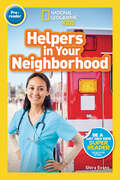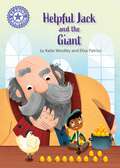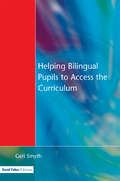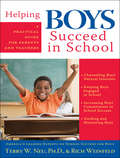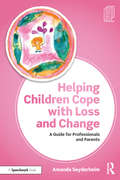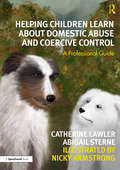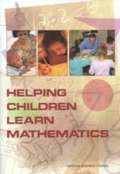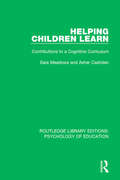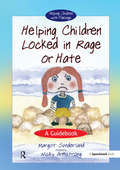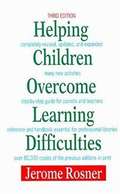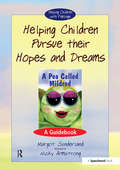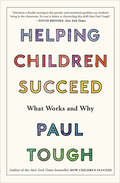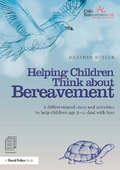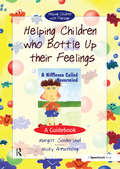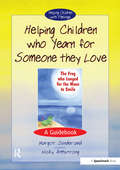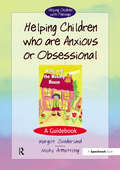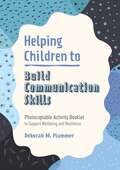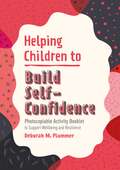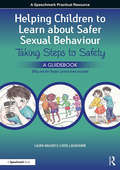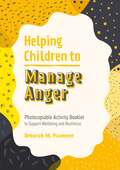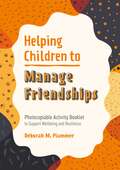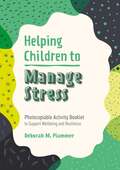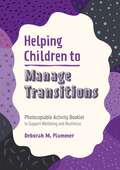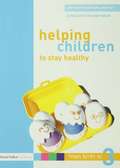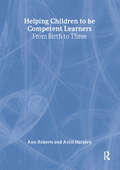- Table View
- List View
Helpers in Your Neighborhood (Readers)
by Shira EvansGet to know the everyday heroes in your community! From firefighters to teachers, mail carriers to crossing guards, neighborhood helpers are all around.Young readers learn about the importance of cooperation and the people who lead the way in our communities. Perfect for beginning readers, National Geographic Pre-readers include simple, expert-vetted text and large, engaging photos on every page. A vocabulary tree at the beginning of the book introduces kids to key words in concept groups, helping kids make connections between words. Plus, a wrap-up activity gives kids a chance to use what they've learned, while expanding their understanding of the world.
Helpful Jack and the Giant: Independent Reading Purple 8 (Reading Champion #517)
by Katie WoolleyThis story is part of Reading Champion, a series carefully linked to book bands to encourage independent reading skills, developed with Dr Sue Bodman and Glen Franklin of UCL Institute of Education (IOE) Fantastic, original stories are accompanied by engaging artwork and a reading activity. Each book has been carefully graded so that it can be matched to a child's reading ability, encouraging reading for pleasure. Perfect for 5-7 year olds.
Helping Bilingual Pupils to Access the Curriculum
by Geri SmythThis book offers practical guidance for teachers working with bilingual pupils in mainstream primary and secondary education and aims to help teachers make the curriculum as accessible as possible to these children. It offers examples of the good practice that has evolved around teaching bilingual children in the classroom.
Helping Boys Succeed in School: A Practical Guide for Parents and Teachers
by Rich Weinfeld Terry W. NeuHelping boys succeed in school and life.
Helping Children Cope with Loss and Change: A Guide for Professionals and Parents
by Amanda SeyderhelmWhether it’s the grief of bereavement, the strain of divorce or the uncertainty of a new home or school, loss and change affect children in countless ways. Nevertheless, teachers and parents frequently find themselves ill-equipped to help children struggling with the difficult feelings that these situations, and others like them, bring. Helping Children Cope with Loss and Change offers guided support for teachers, health professionals and parents. Designed for use with children aged 4-10, this guide offers: Case studies illustrating various signs of grief and loss, to help the caregiver spot and manage a child’s pain. Therapeutic stories designed to be read with the child, and with prompt questions to encourage discussion. Creative activities and exercises that can be developed into a therapeutic ‘toolkit’ to support the child and the caregiver themselves. With chapters that move from Loss and Change to Resolution and Resilience, addressing the needs of both the child and caregiver, Helping Children Cope with Loss and Change will be an invaluable therapeutic tool.
Helping Children Learn About Domestic Abuse and Coercive Control: A Professional Guide (Floss and the Boss)
by Abigail Sterne Catherine LawlerThis book is designed to support professionals with the sensitive and effective use of the storybook, Floss and the Boss, created to help young children understand about domestic abuse and coercive control. By defining domestic abuse and coercive control and exploring the effects upon children and their education, this guidebook puts the professional in a position to have important conversations with children about what to do if something at home does not feel right. When used with the storybook, it provides a vehicle for talking to children about staying safe and their emotional wellbeing. Key features of this book include: Page-by-page notes, with discussion topics and points for conversation around the Floss and the Boss story Activities for supporting children, safety planning strategies and guidance for taking on a key adult role A comprehensive list of helplines and organisations in place to support adult victims of domestic abuse This is a vital tool for teachers, social care staff, therapists and other professionals working with the Floss and the Boss story to teach young children about domestic abuse and coercive control.
Helping Children Learn Mathematics
by Mathematics Learning Study CommitteeFor our youth to succeed, we need to change how we require teaching mathematics. Helping Children Learn Mathematics provides comprehensive and reliable information that will guide efforts to improve school mathematics from pre-kindergarten through eighth grade. The authors discuss the major changes that need to be made in mathematics instruction, instructional materials, assessments, teacher education, and the broader educational system.
Helping Children Learn: Contributions to a Cognitive Curriculum (Routledge Library Editions: Psychology of Education)
by Sara Meadows Asher CashdanOriginally published in 1988, this volume presented a new understanding of how teachers in early childhood education helped children learn. It carefully and critically reviews different teaching approaches, and evaluates two innovatory teaching techniques which were at the focus of recent action research studies and which complemented the traditional early childhood curriculum at the time. The book is intended for all those concerned with early education, including students in initial training or those doing inservice courses for children between 3 and 7. Its contents will still be of relevance to people interested in playgroups and parent education.
Helping Children Locked in Rage or Hate: A Guidebook (Helping Children with Feelings)
by Margot Sunderland Nicky HancockThis is a guidebook to help children who: hurt, hit, bite, smash, kick, shout, scream or who are out of control, hyperaroused or hyperactive; can only discharge their angry feelings in verbal or physical attacks, rather than being able to think about and reflect on what they feel; are angry because it is easier than feeling hurt or sad; are locked in anger or rage because of sibling rivalry; are controlling and punitive; regularly defy authority or are diagnosed with a conduct disorder; commit cold acts of cruelty, hurt animals or do not cry any more; spoil, damage or destroy what others do or make; create fear in others because they have locked away their own fears; do not want to please people, cannot trust, have stopped looking for love or approval or truly believe they do not need anyone; do not really know how to 'like' someone; and, definitely do not know how to love someone or are affectionate only if they want something.
Helping Children Overcome Learning Difficulties (Third Edition)
by Jerome RosnerNew edition of a guide for parents. Explains what to test, why, and what to do with the test results.
Helping Children Pursue Their Hopes and Dreams: A Guidebook (Helping Children with Feelings)
by Margot SunderlandThis is a guidebook to help children who: have been given too little encouragement to follow their hopes and dreams; are too despondent or defeated to go after their hopes or their dreams; are too busy surviving, so hopes and dreams are a luxury they cannot afford; think that hopes and dreams are just for other people; do not follow their dreams because they are too afraid of failing; are following somebody else's star; and, only dream small dreams for themselves, from a fear of being big.
Helping Children Succeed: What Works and Why
by Paul Tough“Research demonstrates that all children have the capacity for . . . success . . . Informative and effective methods to help children overcome issues and thrive.” —Kirkus ReviewsA NOW READ THIS PBS NewsHour and New York Times Book Review selectionIn the New York Times–bestselling How Children Succeed, Paul Tough introduced us to research showing that personal qualities like perseverance, self-control, and conscientiousness play a critical role in children’s success.Now, in Helping Children Succeed, Tough takes on a new set of pressing questions: What does growing up with economic and other stresses do to children’s mental and physical development? How does adversity at home affect their success in the classroom, from preschool to high school? And what practical steps can the adults who are responsible for them take to improve their chances for a positive future?Tough once again encourages us to think in a new way about the challenges of childhood. Mining the latest research in psychology and neuroscience, he provides us with insights and strategies for a new approach to childhood adversity, one designed to help many more children succeed.“Attention is finally turning to the psychic and emotional qualities our children bring to the classroom. No one is better than chronicling this shift than Paul Tough.” —David Brooks, New York Times “Tough convincingly argues that classroom climate is what needs changed in order to shape students’ experiences. . . . For readers concerned with finding practical ways to engage with and improve education for those children with the most to lose.” —Library Journal
Helping Children Think about Bereavement: A differentiated story and activities to help children age 5-11 deal with loss
by Heather ButlerEach year, 3,000 children and young people between the ages of 1 and 19, die as a result of illness or accident.Around 5% of children will have experienced the death of a parent by the time they are 16. Statistics indicate that up to 70% of schools have a bereaved pupil in their care at any given time. Helping Children Think about Bereavement provides a four part differentiated story and activities to help normalise death and allow children to develop emotional literacy to talk about it. The author, along with Child Bereavement UK have devised activities and guidance for teachers on how to use the story to develop children’s emotional literacy and prepare them for bereavement, whether it affects them personally or through a friend’s bereavement. This book also offers support for teachers and parents outlining how children’s understanding of death develops and what can be helpful in supporting bereaved children. The story is presented at different levels: for children aged 9-11 for children aged 7 -9 for children aged 5-7 for children who speak English as a Second Language for children in Early Years or with Learning Difficulties Details surrounding death and its aftermath are not always readily talked about or well handled. When it does happen, children need to be able to express themselves and know that their feelings are a normal part of grieving. This book is an invaluable resource for all key stage one and two teachers, teaching assistants and anyone who is involved in bereavement training.
Helping Children Who Bottle Up Their Feelings: A Guidebook (Helping Children with Feelings)
by Margot Sunderland Nicky HancockA guidebook to help children who: are trying to manage their too painful feelings by themselves; do not let themselves cry, protest or say that they are scared; are living with too many unresolved painful emotions from the past; have had disturbing, overwhelming or confusing experiences, which they have been unable to think through or feel through properly; are full of unexpressed feelings because expressing them feels far too dangerous; and are full of unmourned grief.
Helping Children Who Yearn for Someone They Love: A Guidebook (Helping Children with Feelings)
by Margot SunderlandThis is a guidebook to help children who: "are missing someone too much or suffer from separation anxiety"; are obsessed with their absent parent "yearn for a parent who: has died; seems unreachable, although she is right there; or is loving one minute and indifferent, cold or abusive the next". They yearn because they have been taken into care, fostered or adopted.
Helping Children Who are Anxious or Obsessional: A Guidebook (Helping Children with Feelings)
by Margot SunderlandThis is a guidebook to help children who: are insecure or worry too much; suffer from phobias or nightmares; find it difficult to concentrate to let go and have fun; have suffered a trauma; are worryingly good or seem like little adults; use order and routine as a way of coping with 'messy' feelings; retreat into dullness as a way of managing their being in the world; and, develop obsessive-compulsive behaviour in order to ward off their too-powerful feelings.
Helping Children to Build Communication Skills: Photocopiable Activity Booklet to Support Wellbeing and Resilience (Helping Children to Build Wellbeing and Resilience)
by Deborah PlummerLearning how to communicate effectively and healthily is an important skill for every child to learn. This practical and fun activity booklet facilitates parents, teachers, and therapists to build children's communication skills. It explores how and why we communicate, effective listening, non-verbal communication, and how to stay on topic. Using over thirty years of experience, Deborah Plummer helps children understand that their interactions reflect their beliefs about themselves and others, and shows how to recognise and celebrate the unique and diverse ways in which we express who we are.This book is one of a series based on the use of imagination (I), mindful play (MP) and creative thinking (CT) to enhance social, psychological and emotional wellbeing and resilience in children. The accompanying ebook Using Imagination, Mindful Play and Creative Thinking to Support Wellbeing and Resilience in Children describes the theory and approach behind how these activities can significantly influence children's perceptions of themselves and the world.
Helping Children to Build Self-Confidence: Photocopiable Activity Booklet to Support Wellbeing and Resilience (Helping Children to Build Wellbeing and Resilience)
by Deborah PlummerBuilding self-confidence in children is crucial for healthy psychological, social, and emotional development and wellbeing. This resourceful and fun activity booklet is an invaluable resource for parents, teachers, and therapists in helping to build children's self-confidence. It explores ideas around self-confidence and what that might mean as well as the essentials required to build it. This activity booklet also encourages self-knowledge and self-acceptance through the identification of each child's unique strengths and skills.This book is one of a series based on the use of imagination (I), mindful play (MP) and creative thinking (CT) to enhance social, psychological and emotional wellbeing and resilience in children. The accompanying ebook Using Imagination, Mindful Play and Creative Thinking to Support Wellbeing and Resilience in Children describes the theory and approach behind how these activities can significantly influence children's perceptions of themselves and the world.
Helping Children to Learn About Safer Sexual Behaviour: Taking Steps to Safety, a Guidebook, including Billy and "The Tingles" picturebook
by Laura WalkerThis unique resource comprises a therapeutic workbook and storybook, designed to be used as an early intervention with children within the school setting who display concerning sexual behaviour. The workbook contains a series of activities with accompanying user-friendly advice including how to broach difficult subjects, how to engage with children who have additional needs and how to create conditions of safety to enable the necessary conversations and activities to happen. The programme of work culminates in the creation of a unique and dynamic Safety Plan which is developed collaboratively with the child (as the expert) together with key adults in their lives. The Safety Plan is designed to meet the needs of the child and gives attention to their cultural context and specific likes/interests; this ultimately keeps them and other children safe from further incidents or allegations of sexually concerning behavior. The accompanying storybook, 'Billy and the Tingles' employs narrative therapy, telling the story of a child with sexually concerning behaviour and addressing contemporary issues of exposure to pornography. Laura Walker is a Senior Practitioner in a specialist service working with young people aged 7-17 years old who have displayed sexually concerning/harmful behavior. Laura has been a qualified Social Worker for 15 years with a background in child protection, fostering and sexual abuse work. Laura is currently studying for a Masters in Trauma Studies specialising in the relationship between trauma and sexually concerning behaviour in children. Carol Laugharneis a Practitioner in a specialist service working with young people aged 7-17 years old who have displayed sexually concerning/harmful behavior. Carol is a qualified Youth Worker with 20 years background in a number of settings with children and young people aged 4 - 19 years including Youth Work, Children's Rights, Drug and Alcohol Services, sexual exploitation and children of drug and alcohol using parents.
Helping Children to Manage Anger: Photocopiable Activity Booklet to Support Wellbeing and Resilience (Helping Children to Build Wellbeing and Resilience)
by Deborah PlummerAnger is a very difficult and often misunderstood emotion for children to experience. Facilitating the healthy management of this natural but challenging emotion is crucial for children's social, psychological, and emotional wellbeing and resilience. Based on over thirty years of expertise, Deborah Plummer provides varied and straightforward activities for teachers, parents, and therapists to healthily engage with children and help them manage anger. This activity book allows space to explore anger and varying degrees of emotion whilst also providing help on how to manage it, allowing children to have better and healthier emotional self-awareness.This book is one of a series based on the use of imagination (I), mindful play (MP) and creative thinking (CT) to enhance social, psychological and emotional wellbeing and resilience in children. The accompanying ebook Using Imagination, Mindful Play and Creative Thinking to Support Wellbeing and Resilience in Children describes the theory and approach behind how these activities can significantly influence children's perceptions of themselves and the world.
Helping Children to Manage Friendships: Photocopiable Activity Booklet to Support Wellbeing and Resilience (Helping Children to Build Wellbeing and Resilience)
by Deborah PlummerFriendships and community are very important for the healthy social, psychological, and emotional development of young children. In this fun and accessible activity book, Deborah Plummer deploys over thirty years of expertise for parents, teachers, and therapists to facilitate healthy friendships between children. This activity book explores concepts around child friendships, community, and being part of a group whilst also including sections on cooperation, negotiation, and conflict resolution.This book is one of a series based on the use of imagination (I), mindful play (MP) and creative thinking (CT) to enhance social, psychological and emotional wellbeing and resilience in children. The accompanying ebook Using Imagination, Mindful Play and Creative Thinking to Support Wellbeing and Resilience in Children describes the theory and approach behind how these activities can significantly influence children's perceptions of themselves and the world.
Helping Children to Manage Stress: Photocopiable Activity Booklet to Support Wellbeing and Resilience (Helping Children to Build Wellbeing and Resilience)
by Deborah PlummerFacilitating the healthy management of stress is crucial for the social, psychological, and emotional wellbeing and resilience in children. Based on over thirty years of expertise, Deborah Plummer provides varied and straightforward activities for teachers, parents, and therapists to healthily engage with children and help them manage stress. This activity book allows space to explore stress and help children identify some of their worries, whilst also providing help on how to build skills and strategies that will help them recognise normal signs of stress and how to respond to these appropriately. It also explores the potential benefits and enjoyments of positive stress, allowing children to have a healthy relationship with difficult feelings.This book is one of a series based on the use of imagination (I), mindful play (MP) and creative thinking (CT) to enhance social, psychological and emotional wellbeing and resilience in children. The accompanying ebook Using Imagination, Mindful Play and Creative Thinking to Support Wellbeing and Resilience in Children describes the theory and approach behind how these activities can significantly influence children's perceptions of themselves and the world.
Helping Children to Manage Transitions: Photocopiable Activity Booklet to Support Wellbeing and Resilience (Helping Children to Build Wellbeing and Resilience)
by Deborah PlummerChange and transitions are inevitable but can be an overwhelming and intimidating time for children. Facilitating the healthy management of transitions is crucial for the social, psychological, and emotional wellbeing and resilience in children. Based on over thirty years of expertise experience, Deborah Plummer provides varied and straightforward activities for teachers, parents, and therapists to healthily engage with children and help them process and manage transitions. This activity book aids children in identifying their worries and fears about transitions and facilitates them in building skills and strategies that help them to cope during times of change. It also encourages children to explore the potential benefits and enjoyment that can sometimes be a result of change.This book is one of a series based on the use of imagination (I), mindful play (MP) and creative thinking (CT) to enhance social, psychological and emotional wellbeing and resilience in children. The accompanying ebook Using Imagination, Mindful Play and Creative Thinking to Support Wellbeing and Resilience in Children describes the theory and approach behind how these activities can significantly influence children's perceptions of themselves and the world.
Helping Children to Stay Healthy
by Ann Roberts Avril HarpleyThis isn't about health and safety as such, it's about building the foundations of children's 'well-being': emotionally as well as physically. Helping Children to Stay Healthy covers: emotional well-being growing and developing keeping safe healthy choices. This handy little series of books links directly to the Government’s Birth to Three Matters Framework (DfES 2002). It provides information and ideas for you to read and digest at your own pace, then implement or share with your team.
Helping Children to be Competent Learners
by Ann Roberts Avril HarpleyFor babies, learning is about exploring and finding things out for themselves. Helping Children to be Competent Learners covers: making connections being imaginative being creative representing. This handy little series of books links directly to the Government’s Birth to Three Matters Framework (DfES 2002). It provides information and ideas for you to read and digest at your own pace, then implement or share with your team.
